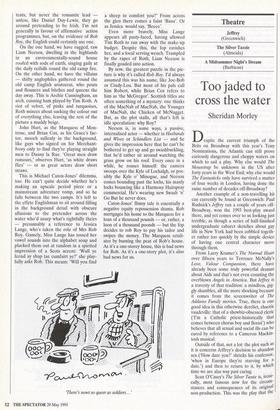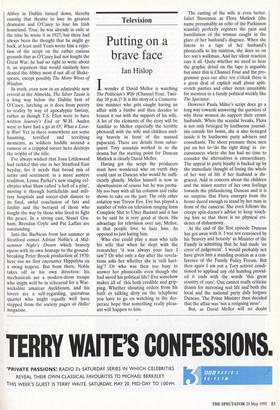Theatre
Jeffrey (Greenwich) The Silver Tassie (Almeida) A Midsummer Night's Dream (Barbican)
Too jaded to cross the water
Sheridan Morley
Despite the current triumph of the Brits on Broadway with this year's Tony Nominations, the Atlantic can still prove curiously dangerous and choppy waters on which to sail a play. Why else would The Mousetrap be unknown in the US after forty years in the West End; why else would The Fantasticks only have survived a matter of four weeks in London, having done the same number of decades off-Broadway?
Another example of a non-travelling hit can currently be found at Greenwich: Paul Rudnick's Jeffrey ran a couple of years off- Broadway, won the 1993 best-play award there, and yet comes over to us looking just terrible, as though a series of half-finished undergraduate cabaret sketches about gay life in New York had been cobbled togeth- er rather too quickly by the simple device of having one central character move through them.
From Larry Kramer's The Normal Heart over fifteen years to Terrence McNally's Love, Valour Compassion, there have already been some truly powerful dramas about Aids and that's not even counting the overblown Angels in America. But Jeffrey is a travesty of that tradition: a mindless, gig- gly shambles, all the more shocking because it comes from the screenwriter of The Addams Family movies. True, there is one good idea in this otherwise derelict, chaotic vaudeville: that of a showbiz-obsessed cleric (I'm a Catholic priest-historically that comes between chorus boy and florist') who believes that all sexual and social ills can be cured by reference to a Cameron Mackin- tosh musical.
Outside of that, not a lot: the plot such as it is concerns Jeffrey's decision to abandon sex Mow dare you?' shrieks his confessor, `when in Europe they're starving for a date.') and then to return to it, by which time we are alas way past caring. Sean O'Casey's The Silver Tassie is, ironi- cally, most famous now for the circum- stances and consequences of its original non-production. This was the play that the Abbey in Dublin turned down, thereby causing that theatre to lose its greatest dramatist and O'Casey to lose his Irish homeland. True, he was already in exile at the time he wrote it in 1927; but there had always been the thought that he might go back, at least until Yeats wrote him a rejec- tion of the script on the rather curious grounds that as O'Casey had not fought the Great War, he had no right to write about it, an argument that would similarly have denied the Abbey most if not all of Shake- speare, except possibly The Merry Wives of Windsor.
In truth, even now in an admirable new revival at the Almeida, The Silver Tassie is a long way below the Dublin best of O'Casey, lurching as it does from poetry to reality by way of apocalyptic fantasy, rather as though T.S. Eliot were to have written Journey's End or W.H. Auden were to have had a go at 0!, What a Love- ly War! Yet in there somewhere are some haunting, terrified and terrifying moments, as soldiers huddle around a cannon or a crippled soccer hero destroys the trophy of the title.
I've always wished that Joan Littlewood had tackled this one in her Stratford East heyday, for it needs that broad mix of satire and sentiment: in a more austere tradition, Lynne Parker's new staging cel- ebrates what Shaw called 'a hell of a play', moving it through battlefields and mili- tary hospitals and soccer-club dances to its final, awful conclusion of fate and futility and the betrayal of those who fought the war by those who lived to fight the peace. In a strong cast, Stuart Gra- ham, Brendan Coyle and Pat Laffan are outstanding.
Into the Barbican from last summer at Stratford comes Adrian Noble's A Mid- summer Night's Dream which bravely opens with its own homage to the ground- breaking Peter Brook production of 1970: here too we first encounter Hippolyta on a swing trapeze. But from there, Noble takes off in his own direction: his. mechanicals are a modern-dress troupe who might well be in rehearsal for a War- wickshire amateur Ayckbourn, and his lovers are a self-regarding, querulous quartet who might equally well have stepped from the society pages of Hello! magazine.



































































 Previous page
Previous page